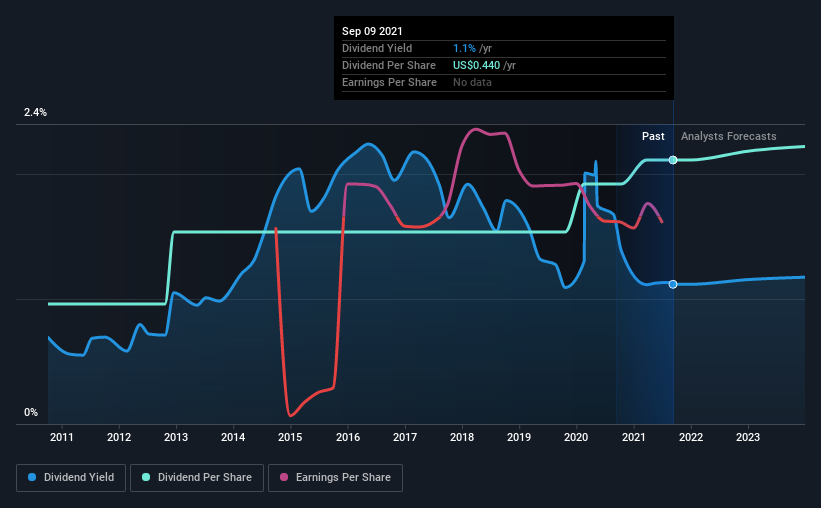Why It Might Not Make Sense To Buy KBR, Inc. (NYSE:KBR) For Its Upcoming Dividend
KBR, Inc. (NYSE:KBR) stock is about to trade ex-dividend in 3 days. The ex-dividend date occurs one day before the record date which is the day on which shareholders need to be on the company's books in order to receive a dividend. The ex-dividend date is of consequence because whenever a stock is bought or sold, the trade takes at least two business day to settle. Meaning, you will need to purchase KBR's shares before the 14th of September to receive the dividend, which will be paid on the 15th of October.
The company's next dividend payment will be US$0.11 per share, and in the last 12 months, the company paid a total of US$0.44 per share. Looking at the last 12 months of distributions, KBR has a trailing yield of approximately 1.1% on its current stock price of $39.37. Dividends are an important source of income to many shareholders, but the health of the business is crucial to maintaining those dividends. So we need to check whether the dividend payments are covered, and if earnings are growing.
See our latest analysis for KBR
Dividends are usually paid out of company profits, so if a company pays out more than it earned then its dividend is usually at greater risk of being cut. KBR lost money last year, so the fact that it's paying a dividend is certainly disconcerting. There might be a good reason for this, but we'd want to look into it further before getting comfortable. Given that the company reported a loss last year, we now need to see if it generated enough free cash flow to fund the dividend. If KBR didn't generate enough cash to pay the dividend, then it must have either paid from cash in the bank or by borrowing money, neither of which is sustainable in the long term. The good news is it paid out just 17% of its free cash flow in the last year.
Click here to see the company's payout ratio, plus analyst estimates of its future dividends.
Have Earnings And Dividends Been Growing?
Businesses with shrinking earnings are tricky from a dividend perspective. If business enters a downturn and the dividend is cut, the company could see its value fall precipitously. KBR was unprofitable last year and, unfortunately, the general trend suggests its earnings have been in decline over the last five years, making us wonder if the dividend is sustainable at all.
Many investors will assess a company's dividend performance by evaluating how much the dividend payments have changed over time. KBR has delivered an average of 8.2% per year annual increase in its dividend, based on the past 10 years of dividend payments.
Remember, you can always get a snapshot of KBR's financial health, by checking our visualisation of its financial health, here.
The Bottom Line
Should investors buy KBR for the upcoming dividend? It's hard to get used to KBR paying a dividend despite reporting a loss over the past year. At least the dividend was covered by free cash flow, however. It's not the most attractive proposition from a dividend perspective, and we'd probably give this one a miss for now.
Although, if you're still interested in KBR and want to know more, you'll find it very useful to know what risks this stock faces. To help with this, we've discovered 1 warning sign for KBR that you should be aware of before investing in their shares.
We wouldn't recommend just buying the first dividend stock you see, though. Here's a list of interesting dividend stocks with a greater than 2% yield and an upcoming dividend.
This article by Simply Wall St is general in nature. We provide commentary based on historical data and analyst forecasts only using an unbiased methodology and our articles are not intended to be financial advice. It does not constitute a recommendation to buy or sell any stock, and does not take account of your objectives, or your financial situation. We aim to bring you long-term focused analysis driven by fundamental data. Note that our analysis may not factor in the latest price-sensitive company announcements or qualitative material. Simply Wall St has no position in any stocks mentioned.
Have feedback on this article? Concerned about the content? Get in touch with us directly. Alternatively, email editorial-team (at) simplywallst.com.

